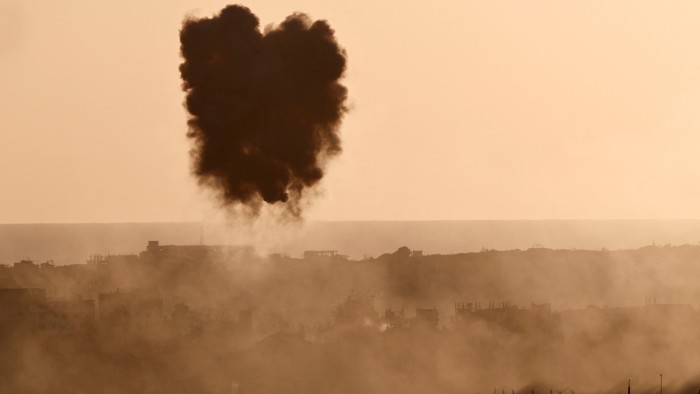Unlock the Editor’s Digest for free
Roula Khalaf, Editor of the FT, selects her favourite stories in this weekly newsletter.
Israel has rejected changes demanded by Hamas to a Gaza ceasefire proposal as “unacceptable,” but Benjamin Netanyahu said he was still sending a negotiating team to Doha to begin indirect talks aimed at halting the 21-month war.
The Israeli decision came late on Saturday after a meeting of the prime minister’s security cabinet. The meeting was convened to discuss Hamas’s response to a proposal crafted by Qatar, the US, and Egypt that calls for a 60-day ceasefire, the release of 28 Israeli hostages, and the start of talks over a permanent end to the conflict.
“The changes that Hamas is seeking to make in the Qatari proposal were conveyed to us last night and are unacceptable to Israel,” Netanyahu’s office said in a statement, before adding that a negotiating team would be leaving on Sunday to begin “proximity talks . . . for the return of our hostages.”
Israel said it had accepted the original proposal put forward by the mediators.
Hamas said on Friday it had delivered a “positive” response to the mediators and that it was “fully prepared and serious about immediately entering a new round of negotiations on the mechanism for implementing this framework.”
It remains unclear what changes or clarifications the Palestinian militant group had requested.
According to drafts seen by the Financial Times and confirmed by two people familiar with the negotiations, additional talks are required to finalise the scope of Israel’s military withdrawal from Gaza during the two-month ceasefire, as well as the number and identities of Palestinian prisoners meant to be released from Israeli prisons in exchange for the hostages.
Gaps are also believed to exist between the two warring parties over the humanitarian aid mechanism for the besieged enclave, as well as the extent of US guarantees that the initial ceasefire will lead to a permanent end to the war.
Netanyahu is set to leave for Washington on Sunday, ahead of a meeting at the White House the next day with US President Donald Trump, who has made clear his desire for a ceasefire.
Trump said late on Friday night that he was “very optimistic” a deal could be reached “next week,” before adding “it changes from day to day”.
Trump posted this week on his Truth Social media platform that he intended to be “very firm” with Netanyahu when he met with him, but issued a warning to Hamas: “I hope, for the good of the Middle East, that Hamas takes this Deal, because it will not get better — IT WILL ONLY GET WORSE.”
Netanyahu is expected to face opposition from far-right allies inside his governing coalition over any truce deal that halts the war short of the complete “destruction” of Hamas.
Itamar Ben-Gvir, national security minister, demanded on social media platform X on Saturday night that the Israeli military reconquer the entirety of the enclave, halt the entry of all humanitarian aid, and encourage Gazans to “emigrate” out.
“I call on the Prime Minister to abandon the path of surrender and return to the path of victory,” he added.
According to the draft proposals seen by the FT, Trump would “guarantee” that the conflict be halted for 60 days, during which 10 living Israeli hostages and the bodies of 18 more would be released in five phases.
There are 50 hostages seized during Hamas’s October 7, 2023 attack still in captivity, 20 of whom are believed to be alive.
As part of the agreement, “serious negotiations” to end the war — a long-held Hamas demand — would be initiated on the first day, with the mediators set to provide guarantees to extend the truce should additional time be needed to reach a permanent ceasefire.
Netanyahu has consistently refused to commit to ending the war in Gaza until a “total victory” over Hamas had been achieved. A shortlived ceasefire broke down earlier this year, with the Israeli premier demanding Hamas’s complete surrender and the release of additional hostages and the Palestinian group refusing to capitulate.
Talks over a permanent end to the fighting, which were mandated in that truce agreement, never got under way, and Israel renewed a devastating military offensive in the shattered territory in March.



